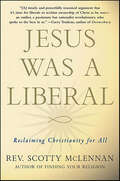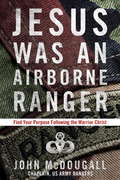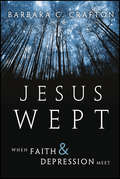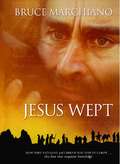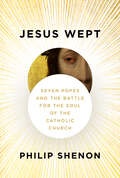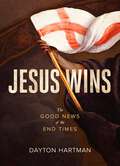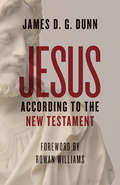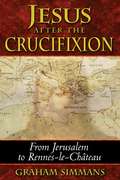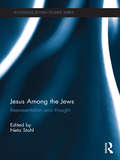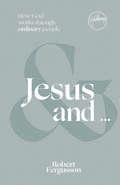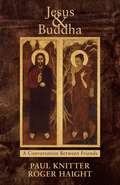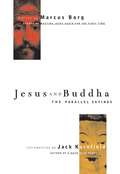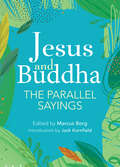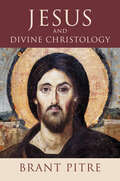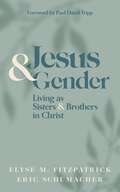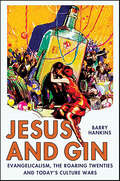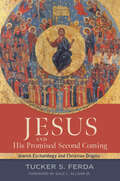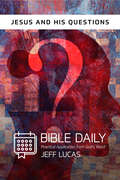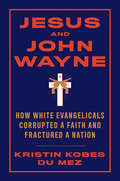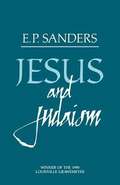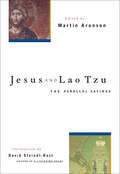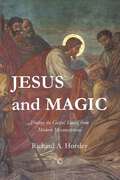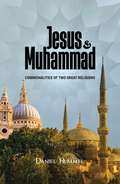- Table View
- List View
Jesus Was a Liberal: Reclaiming Christianity for All
by Scotty McLennanFor the millions of people who identify as liberal Christians. In McLennan's bold call to reclaim ownership of Christianity, he advocates a sense of religion based not on doctrinal readings of scripture but on the humanity behind Christ's teachings. He addresses such topics as intelligent design, abortion, same sex marriage, war. torture and much, much more. As he says in the Preface, "We liberal Christians know in our hearts that there is much more to life than seems to meet the rational eye of atheists; yet we find it hard to support supernatural claims about religion that fly in the face of scientific evidence."
Jesus Was an Airborne Ranger
by Stu Weber John McdougallThe Raid that Rescued Us. The Mission that Defines Our Lives. You are trapped behind enemy lines. You feel it every day. Powerful forces want to destroy you and those you love. Completely surrounded, you see no means to escape. Sadly, the Jesus we often picture is too timid to help--more like a daytime talk show host than a dangerous Rescuer. Who would follow--much less risk everything--for such a leader? Get ready to see Jesus like you've never seen him before--a battle-scarred Combatant who stared death in the face and won. This is no Sunday-school Jesus, meek and mild. This is the Warrior Christ who has descended from the heavens, defeated the Enemy, and rescued humanity. Now, he calls us to continue his mission and fight for others--our families, our communities, and the world. In Jesus Was an Airborne Ranger, Army Chaplain John McDougall offers an alternative to the soft, gentle caricature of Jesus. Only the Warrior Christ can impact our broken world. And only in following him can you find the life of purpose you've always wanted. SUIT UP. It's time to enter the fight with the first and greatest Airborne Ranger.The views expressed in this book are those of the author and do not reflect the official policy or position of the U.S. Army, the Department of Defense or the U.S. government.From the Trade Paperback edition.
Jesus Wept
by Barbara C. CraftonIn the first book to discuss depression from a faith perspective, Barbara Crafton expertly weaves personal stories and helpful resources to explore depression as it is affected (for both better and worse) by Christian faith. She contends that it is harder for people of faith to come to terms with depression since they may attribute its causes to something they have done, rather than to its true root in physiology and genetics. This is a book people will want to buy for themselves and give loved ones who are suffering from depression and wondering where God is during their pain and suffering. Barbara C. Crafton (Metuchen, NJ) is an Episcopal priest, spiritual director, and author. She is the founder and head of the Geranium Farm (geraniumfarm. org), an online institute for the promotion of spiritual growth.
Jesus Wept
by Bruce MarchianoTwo words. John 11:35. It is the shortest verse in the entire Bible and it reads, "Jesus wept." Have you ever considered the monumental truth behind that verse? Jesus, fully man and fully God, found himself in the midst of human tragedy -- the death of a dear friend -- the death of a dear friend -- and he did what we would do. He cried. In this utterly profound book, Bruce Marchiano explores the head and heart of Jesus to answer questions hurting people have been asking for generations. Where was Jesus when I buried my husband? What was Jesus' reaction when my son was paralyzed? Or when my baby died? Or when the bus overturned? Or the tornado hit? When the terrorists struck on September 11, how did Jesus respond? The answer just might blow you away. Jesus wept.
Jesus Wept: Seven Popes and the Battle for the Soul of the Catholic Church
by Philip ShenonFrom the best-selling author and former New York Times investigative reporter, an unprecedented look at the defining struggles of the modern Catholic Church, told through the lives of the last seven popesWhen the jolly Italian peasant-turned-cardinal Angelo Giuseppe Roncalli of Venice was elected Pope John XXIII in 1958, change was in the air. The Church, many said, had refused to enter the twentieth century. In response, Pope John launched Vatican II, an &“ecumenical council&” that summoned hundreds of church leaders to Rome. It marked one of the most progressive turns the Church had taken in centuries: &“medicine of mercy,&” as Pope John called it. Yet not everyone in the Church was prepared to accept this modernization. The lines were drawn—in a battle that continues to rage into the twenty-first century.In Jesus Wept, Philip Shenon takes us inside the Holy See to reveal its intricacies, hypocrisies, and hidden maneuverings, bringing all the momentous disputes and issues vividly to life: priestly celibacy, birth control, homosexuality, restoring ties with other Christians and Jews, shameful sex abuse crimes, the role of women in the Church.In his rich portrayals of the popes from John to Francis, Shenon draws on research across four continents, including hundreds of interviews and the exhaustive archival material. He also brings to light other key figures in the Church, such as Cardinal Alfredo Ottaviani, the incredibly powerful, conservative, and staunchly anticommunist director of the Holy Office under Pius XII, who lived proudly by the motto semper idem—&“always the same.&” This is a consummate, vibrant history of the modern Church.
Jesus Wins: The Good News of the End Times
by Dayton HartmanReclaiming our common hope. Too often discussions about the End Times are fraught with wild speculation or discord. But a biblical view of eschatology places Jesus' return and victory at the center. All Christians hold this hope in common. In Jesus Wins, Dayton Hartman focuses on this common ground to reveal why the way we think about the End Times matters. Christian eschatology should be rooted in biblical orthodoxy to inspire hope and greater faithfulness in the present age. That's the point of eschatology after all! Drawing from his own ministry experience, Hartman testifies to the unifying power of Jesus' victory.
Jesus according to the New Testament
by Rowan Williams James D. DunnNew Testament scholar James D. G. Dunn has published his research on Christian origins in numerous commentaries, books, and essays. In this small, straightforward book designed especially for a lay audience, Dunn focuses his fifty-plus years of scholarship on elucidating the New Testament witness to Jesus, from Matthew to Revelation. Dunn’s Jesus according to the New Testament constantly points back to the wonder of those first witnesses and greatly enriches our understanding of Jesus.
Jesus according to the New Testament
by James D. G. DunnNew Testament scholar James D. G. Dunn has published his research on Christian origins in numerous commentaries, books, and essays. In this small, straightforward book designed especially for a lay audience, Dunn focuses his fifty-plus years of scholarship on elucidating the New Testament witness to Jesus, from Matthew to Revelation. Dunn&’s Jesus according to the New Testament constantly points back to the wonder of those first witnesses and greatly enriches our understanding of Jesus.
Jesus after the Crucifixion: From Jerusalem to Rennes-le-Château
by Graham SimmansSuggests that Jesus survived the crucifixion, went to Egypt, then settled in France • Reveals new discoveries that show the beginnings of Christianity in Egypt • Presents historical and archaeological research that proves a connection between Jerusalem, Egypt, and Rennes-le-Château in the south of France • Posits Rennes-le-Château as the actual location of Jesus Christ’s tomb, and that writings by him will be found there Jesus did not die on the cross. He survived and went to southern France with his wife, Mary. This possibility is proposed by Graham Simmans, who spent many years on a quest to find the real beginnings of Christianity. Simmans believes that the spread of Christianity beyond Jerusalem was tied to Jesus’s survival of the crucifixion and his subsequent emigration to Europe. Using Coptic and Jewish sources, including the Talmud, that allow a glimpse of the Christian philosophy espoused by Jesus, he contends that true Christianity was brought into France, Britain, and Spain from first century Egypt and Judea, not fourth- and fifth-century Rome. His investigation shows that after a time in Egypt, Jesus settled in Rennes-le-Château, a sophisticated and cosmopolitan center of spiritual diversity. It was a natural move for Jesus to settle in the Narbonne area of France--an area already heavily settled by Jewish and Gnostic groups. Here, safely outside the reach of the cultural dictatorship of the Roman Church, the Gnostic secrets he taught survived the centuries. Later, the Knights Templar centered their activity in the Languedoc region around Rennes-le-Château, where, within the Jewish communities, a well-connected and influential opposition to Rome already existed. This resistance to Rome gave rise to a religious culture that included elements of Gnostic, Pythagorean, and Kabbalistic teachings. Until the Crusades against the Cathar heretics reasserted the dominion of Rome, the culture that flourished around Rennes-le-Château embodied the true essence of Christ’s message.
Jesus among the Jews: Representation and Thought (Routledge Jewish Studies Series)
by Neta StahlFor almost two thousand years, various images of Jesus accompanied Jewish thought and imagination: a flesh-and-blood Jew, a demon, a spoiled student, an idol, a brother, a (failed) Messiah, a nationalist rebel, a Greek god in Jewish garb, and more. This volume charts for the first time the different ways that Jesus has been represented and understood in Jewish culture and thought. Chapters from many of the leading scholars in the field cover the topic from a variety of disciplinary perspectives - Talmud, Midrash, Rabbinics, Kabbalah, Jewish Magic, Messianism, Hagiography, Modern Jewish Literature, Thought, Philosophy, and Art – to address the ways in which representations of Jesus contribute to and change Jewish self-understanding throughout the last two millennia. Beginning with the question of how we know that Jesus was a Jew, the book then moves through meticulous analyses of Jewish and Christian scripture and literature to provide a rounded and comprehensive analysis of Jesus in Jewish Culture. This multidisciplinary study will be of great interest not only to students of Jewish history and philosophy, but also to scholars of religious studies, Christianity, intellectual history, literature and cultural studies.
Jesus and ...: How God works through ordinary people
by Robert FergussonBible teacher and pastor Robert Fergusson takes you on a journey through the book of Luke to discover the beauty and transformative power of an authentic encounter with Jesus. Every person Jesus met led to a life-changing transformation. Dive into the book of Luke and see how God works in and through ordinary, flawed people—like you and me. This interactive book features: Jesus and ... Zechariah, Elizabeth, and John: Finding hope for your family. Jesus and ... Anna: Finding significance in the ordinary. Jesus and ... John the Baptist: Finding purpose in life. Jesus and ... the man with leprosy: Finding acceptance and healing. Jesus and ... the centurion: Finding faith in a time of unbelief. Each chapter ends with thoughtful questions that invite you to pause, reflect, and respond. Jesus and … also includes powerful photography and inspiring design, enhancing each biblical truth you explore. Encounter Jesus like never before—and prepare your heart and mind for the transformative work God can do in your life.
Jesus and Buddha: Friends in Conversation
by Roger Haight Paul KnitterTwo friends, one a Christian theologian, the other a Buddhist-Christian theologian, explore how a conversation between Christians and Buddhists can clarify and support a spirituality that is experimentally real (mystical) as well as socially engaged (prophetic). From basic questions about Buddha and Jesus - who were they? what did they teach? - Paul Knitter and Roger Haight explore Buddhist and Christian notions about ultimate reality, human nature, spiritual practice, and the question of work for peace and social transformation. they also address the nature of interreligious dialogue and the possibilities of "religious double belonging" - is it possible? dangerous? necessary?
Jesus and Buddha: The Parallel Sayings
by Jack Kornfield Marcus BorgJESUS & BUDDHA THE PARALLEL SAYINGSThis remarkable collection reveals how Jesus and Buddha-whether talking about love, wisdom, or materialism-were guiding along the same path. Jesus & Buddha also delves into the mystery surrounding their strikingly similar teachings and presents over one hundred examples from each.As a Christian, I grew up with Jesus and have lived with him all my life. I have not lived with the Buddha. Similarly my work on this book was from the vantage point of a Jesus scholar. But my experience has led me to the conclusion that their teachings about 'the way' are virtually identical and that together they are the two most remarkable religious figures who ever lived."-Marcus BorgYou hold in your hand a remarkable and beautiful book. Jesus and Buddha are now meeting in an encounter of the spirit. When we listen deeply to their words we find that in many ways, they speak with one heart. If we could enact even one verse from these teachings, it would have the power to illuminate our hearts, free us from confusion and transform our lives."-Jack Kornfield
Jesus and Buddha: The Parallel Sayings
by Marcus J. BorgSide-by-side examples that let you discover the teachings of Jesus and Buddha—and the striking similarities between them. This stunning collection is perfect for those curious about the influential teachers Jesus and Buddha, and their lessons of peace, love, patience, and kindness. Witness as two of the most holy beings meet in a thought-provoking encounter of the spirit. Compare the Bible verse: “Jesus knew all people and needed no one to testify about anyone; for he himself knew what was in everyone” (John 2.24-25) to the Buddhist scripture: “He was expert in knowing the thoughts and actions of living beings” (Vimalakirtinirdesha Sutra 2).Written by a renowned New Testament scholar and national bestselling author, and with an introduction by Jack Kornfield, Jesus and Buddha is a timeless testament to what makes us similar rather than different. With over 100 examples presented side by side, this is a perfect book for anyone interested in Christianity, Buddhism, mindfulness, meditation, and all ways of seeking enlightenment.
Jesus and Divine Christology
by Brant PitreDid Jesus see himself as divine? Since the beginning of the quest for the historical Jesus, scholars have dismissed the idea that Jesus could have identified himself as God. Such high Christology is frequently depicted as an invention of the councils of Nicaea and Chalcedon, centuries later. Yet recent research has shown that the earliest Jewish followers of Jesus already regarded him as divine. Brant Pitre tackles this paradox in his bold new monograph. Pitre challenges this widespread assumption and makes a robust case that Jesus did consider himself divine. Carefully explicating the Gospels in the context of Second Temple Judaism, Pitre shows how Jesus used riddles, questions, and scriptural allusions to reveal the apocalyptic secret of his divinity. Moreover, Pitre explains how Jesus acts as if he is divine in both the Synoptics and the Gospel of John. Carefully weighing the historical evidence, Pitre argues that the origins of early high Christology can be traced to the historical Jesus&’s words and actions. Jesus and Divine Christology sheds light on long-neglected yet key evidence that the historical Jesus saw himself as divine. Scholars and students of the New Testament—and anyone curious about the Jewish context of early Christianity—will find Pitre&’s argument a necessary and provocative corrective to a critically underexamined topic.
Jesus and Gender: Living as Sisters and Brothers in Christ
by Eric Schumacher Elyse M. FitzpatrickLoving one another as sisters and brothers in Jesus Many Christian women and men carry heavy burdens. Much teaching on gender relations, roles, and rules binds the conscience beyond what Scripture actually teaches. Gender has become a battleground for power. But God created men and women not to compete for glory but to cooperate for his glory. In Jesus and Gender, Elyse Fitzpatrick and Eric Schumacher paint a new vision for gender—Christ's gentle and lowly heart. The centrality of the gospel has been lost in gender debates. Our ultimate example is Jesus, our humble king, who used his power to serve others. So we must rethink our identities, roles, and relationships around him. Christ transformed enemies into family. Men and women are allies in God's mission. Drawing from Scripture and experience, Fitzpatrick and Schumacher show how Jesus's example speaks to all areas of our lives as men and women, including vocation, marriage, parenting, friendships, and relating to each other as sisters and brothers in Christ. Real--life testimonies from a variety of Christians—including Christine Caine, Justin Holcomb, Karen Swallow Prior, and others—show a variety of men and women freed to pursue their gifts for God's glory. Fitzpatrick and Schumacher's perspective untangles what God has said about gender from what he hasn't. By coming to Jesus, women and men can find rest.
Jesus and Gin: Evangelicalism, the Roaring Twenties and Today's Culture Wars
by Barry HankinsJesus and Gin is a rollicking tour of the roaring twenties and the barn- burning preachers who led the temperance movement—the anti-abortion crusade of the Jazz Age. Along the way, we meet a host of colorful characters: a Baptist minister who commits adultery in the White House; media star preachers caught in massive scandals; a presidential election hinging on a religious issue; and fundamentalists and liberals slugging it out in the culture war of the day. The religious roar of that decade was a prologue to the last three decades. With the religious right in disarray today after its long ascendancy, Jesus and Gin is a timely look at a parallel age when preachers held sway and politicians answered to the pulpit.
Jesus and His Promised Second Coming: Jewish Eschatology and Christian Origins
by Tucker S. FerdaIn this pioneering study of Scripture and reception history, Tucker S. Ferda shows that the hope for Jesus&’s second coming originated in his own message about the coming of the kingdom after a time of distress. Most historical Jesus scholars take for granted that Jesus&’s second coming was invented by his zealous early followers. In Jesus and His Promised Second Coming, Tucker S. Ferda challenges this critical consensus. Using innovative methodology, Ferda works backward through reception history to Paul and the Gospels to argue that the hope for the second coming originated in Jesus&’s own grappling with the prospect of death and his conviction that the kingdom was near; he expected a return that would coincide with the final judgment and the end of the age within the space of a generation. Ferda also makes a major contribution to the reception history of the Bible, shedding light on how Christians distinguished their faith from Judaism by deriding &“Jewish messianism&” as earthly minded and militaristic. In the early modern period, critics found an expedient way to distance Jesus from this caricature of &“Jewish messianism&”: they pinned the expectation for the second coming on Jesus&’s early followers. A new appreciation for the diversity of Judaism and messianism in the Second Temple period makes possible a fresh reconstruction of Jesus. Bold and historically astute, Jesus and His Promised Second Coming breathes new life into a long-stagnant conversation. It also offers readers fresh insight into the history of Jewish-Christian relations. Students and scholars of the New Testament will need to read and engage with Ferda&’s provocative argument.
Jesus and His Questions (Bible Daily Notes: Practical Application from God's Word)
by Jeff LucasEver met someone who had all the answers? Even when you didn&’t want to know what they were? The person who knew exactly what you should do in a situation you had been struggling with for weeks—even though he or she had been listening to you for only thirty seconds? Jesus could have been like that, but He wasn&’t. Instead, He was often the one asking the questions—and treasuring the answers. Jesus&’ questions tell us so much about Him, and us, and how we should relate to Him and emulate Him. So let&’s pinpoint and delve into the questions Jesus posed during His ministry on earth. They could transform your life as they have transformed the lives of so many before you—and will continue to do so for countless more in the future. Bible Daily notes are written by Jeff Lucas to help you apply the lessons of God&’s Word daily. Each day and with each devotion, Jeff uses his signature wit and wisdom to reveal insights and practical application you can use in your own life. Each Bible devotion takes only a few minutes to read, but the lessons learned can last a lifetime.
Jesus and His World
by Craig A. EvansIn this provocative work, world-renowned scholar Craig A. Evans presents the most important archaeological discoveries that shed light on the world of Jesus of Nazareth. Evans takes on many sensational claims that have been proposed in recent books and peddled in the media, and uses actual archaeological findings to uncover the truth about several key pieces of Jesus' world. For example, what was the village of Nazareth actually like in the time of Jesus? Did synagogues really exist, as the Gospels say? What does archaeology tell us about the ruling priests who condemned Jesus to death? Has the tomb of Jesus really been found, as has been claimed? Evans's engaging prose enables readers to understand and critique the latest theories--both the sober and the sensational--about who Jesus was and what he lived and died for. Questions for discussion and reflection are available at www. wjkbooks. com, making this book ideal for group or individual study.
Jesus and John Wayne: How White Evangelicals Corrupted A Faith And Fractured A Nation
by Kristin Kobes Du MezA scholar of American Christianity presents a seventy-five-year history of evangelicalism that identifies the forces that have turned Donald Trump into a hero of the Religious Right. How did a libertine who lacks even the most basic knowledge of the Christian faith win 81 percent of the white evangelical vote in 2016? And why have white evangelicals become a presidential reprobate’s staunchest supporters? These are among the questions acclaimed historian Kristin Kobes Du Mez asks in Jesus and John Wayne, which delves beyond facile headlines to explain how white evangelicals have brought us to our fractured political moment. Challenging the commonly held assumption that the “moral majority” backed Donald Trump for purely pragmatic reasons, Du Mez reveals that Donald Trump in fact represents the fulfillment, rather than the betrayal, of white evangelicals’ most deeply held values. Jesus and John Wayne is a sweeping account of the last seventy-five years of white evangelicalism, showing how American evangelicals have worked for decades to replace the Jesus of the Gospels with an idol of rugged masculinity and Christian nationalism, or in the words of one modern chaplain, with “a spiritual badass.” As Du Mez explains, the key to understanding this transformation is to recognize the role of culture in modern American evangelicalism. Many of today’s evangelicals may not be theologically astute, but they know their VeggieTales, they’ve read John Eldredge’s Wild at Heart, and they learned about purity before they learned about sex—and they have a silver ring to prove it. Evangelical books, films, music, clothing, and merchandise shape the beliefs of millions. And evangelical popular culture is teeming with muscular heroes—mythical warriors and rugged soldiers, men like Oliver North, Ronald Reagan, Mel Gibson, and the Duck Dynasty clan, who assert white masculine power in defense of “Christian America.” Chief among these evangelical legends is John Wayne, an icon of a lost time when men were uncowed by political correctness, unafraid to tell it like it was, and did what needed to be done. Trump, in other words, is hardly the first flashy celebrity to capture evangelicals’ hearts and minds, nor is he the first strongman to promise evangelicals protection and power. Indeed, the values and viewpoints at the heart of white evangelicalism today—patriarchy, authoritarian rule, aggressive foreign policy, fear of Islam, ambivalence toward #MeToo, and opposition to Black Lives Matter and the LGBTQ community—are likely to persist long after Trump leaves office. A much-needed reexamination, Jesus and John Wayne explains why evangelicals have rallied behind the least-Christian president in American history and how they have transformed their faith in the process, with enduring consequences for all of us.
Jesus and Judaism
by E. P. SandersThis work takes up two related questions with regard to Jesus: his intention and his relationship to his contemporaries in Judaism. These questions immediately lead to two others: the reason for his death (did his intention involve an opposition to Judaism which led to death?) and the motivating force behind the rise of Christianity (did the split between the Christian movement and Judaism originate in opposition during Jesus' lifetime?).
Jesus and Lao Tzu: The Parallel Sayings
by Ph.D. Brother David Steindl-Rast Martin AronsonComparing the New Testament with the Tao Te Ching, Taoism's most sacred book, Jesus and Lao Tzu reveals a surprising set of examples in which these two spiritual masters point their followers in the same direction. With over 90 parallel sayings, readers find fresh understanding and new perspectives here, since the time-honored teachings are presented side by side. The book also shows how these shared truths transcend traditional religious boundaries.
Jesus and Magic: Freeing the Gospel Stories from Modern Misconceptions
by Richard A HorsleyIt has become standard in modern interpretation to say that Jesus performed miracles, and even mainline scholarly interpreters classify Jesus's healings and exorcisms as miracles. Some highly regarded scholars have argued, more provocatively, that the healings and exorcisms were magic, and that Jesus was a magician. As Richard Horsley points out, if we make a critical comparison between modern interpretation of Jesus's healing and exorcism, on the one hand, and the Gospel stories and other ancient texts, on the other hand, it becomes clear that the miracle and magic are modern concepts, products of Enlightenment thinking. 'Jesus and Magic' asserts that Gospel stories do not have the concepts of miracle and magic. What scholars constructed as magic turns out to have been ritual practices such as songs (incantations), medicines (potions), and appeals to higher powers for protection. Horsley offers a critical reading of the healing and exorcism episodes in the Gospel stories. This reading reveals a dynamic relationship between Jesus the healer, the trust of those coming for healing, and their support networks in local communities. Horsley's reading of the Gospel stories gives little or no indication of divine intervention. Rather, the healing and exorcism stories portray healings and exorcisms.
Jesus and Muhammad: Commonalities of Two Great Religions
by Daniel HummelJesus and Muhammad lived in different times and in different contexts. An absolute comparison of the careers of these two men is not a satisfactory method in understanding the similarities and differences between their teachings. This book approaches this topic from a different perspective. The time that Muhammad preached in Mecca is compared to the time Jesus spent preaching throughout Palestine. This improves the similarities in contexts between them and makes a comparison more valid. The number of similarities outweighs the number of differences when looking at the four books of the Gospel and the chapters of the Qur'an revealed in Mecca. On issues related to prayer, the Oneness of God, charity, the Hereafter and forgiveness the teachings in these two books are practically the same. A number of core theological issues surfaced in the Book of John do clash with Qur&’anic teachings about the person of Jesus. These differences and the possible reasons for them are explored in this book. The conclusion of this book is that Muslims and Christians have more shared values and even theological similarities than differences. It is recommended that Muslims and Christians should spend more time understanding these commonalities.
